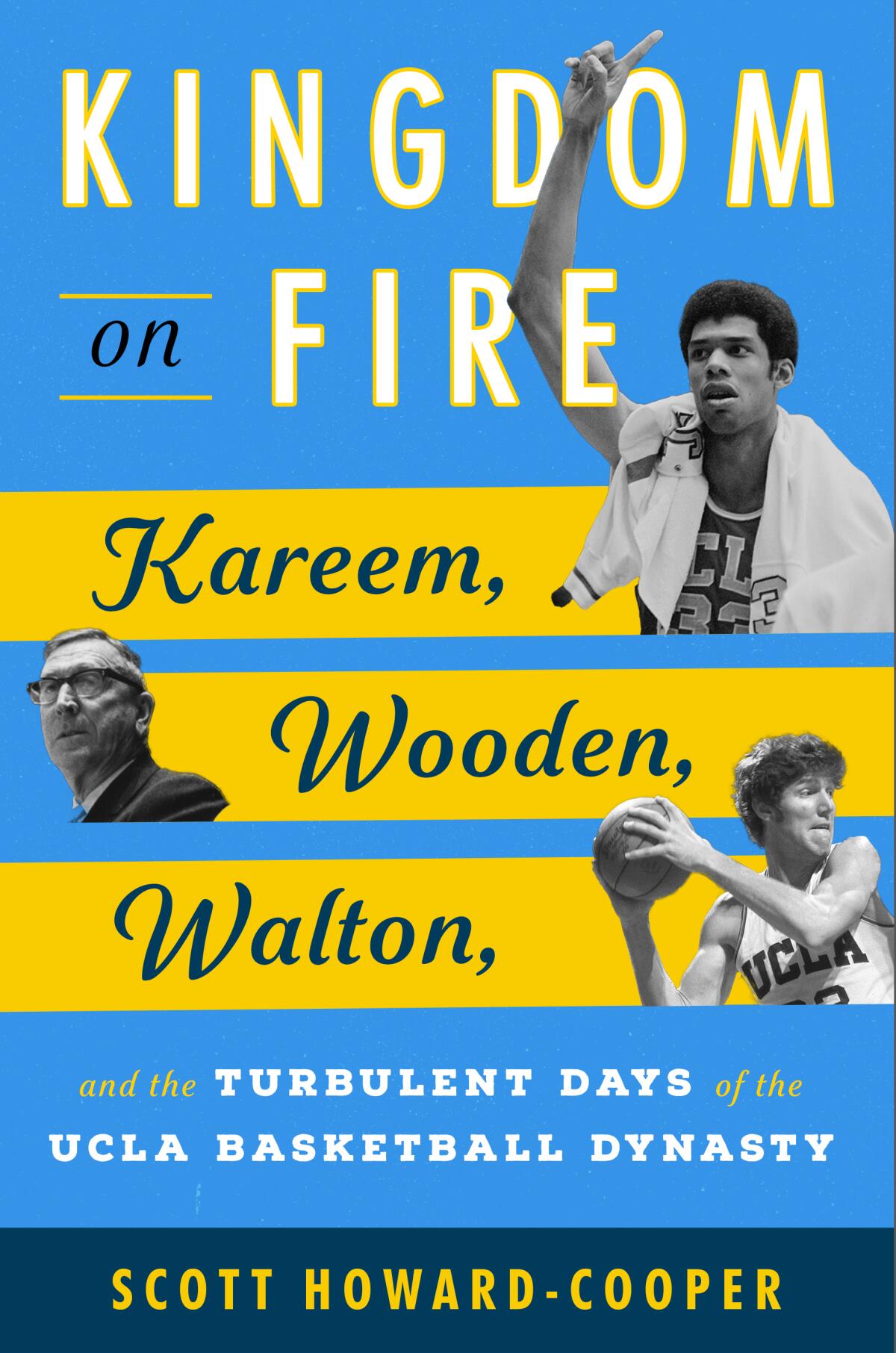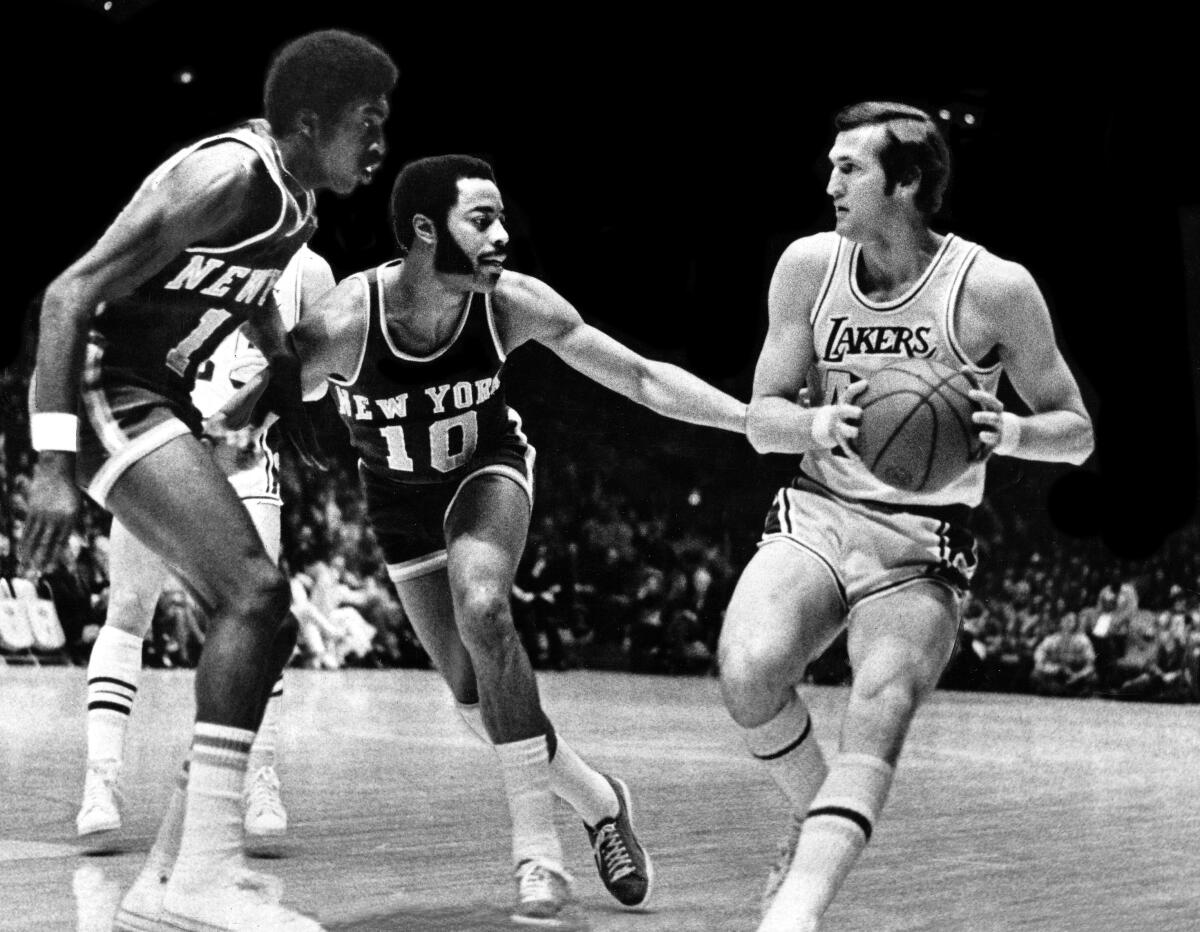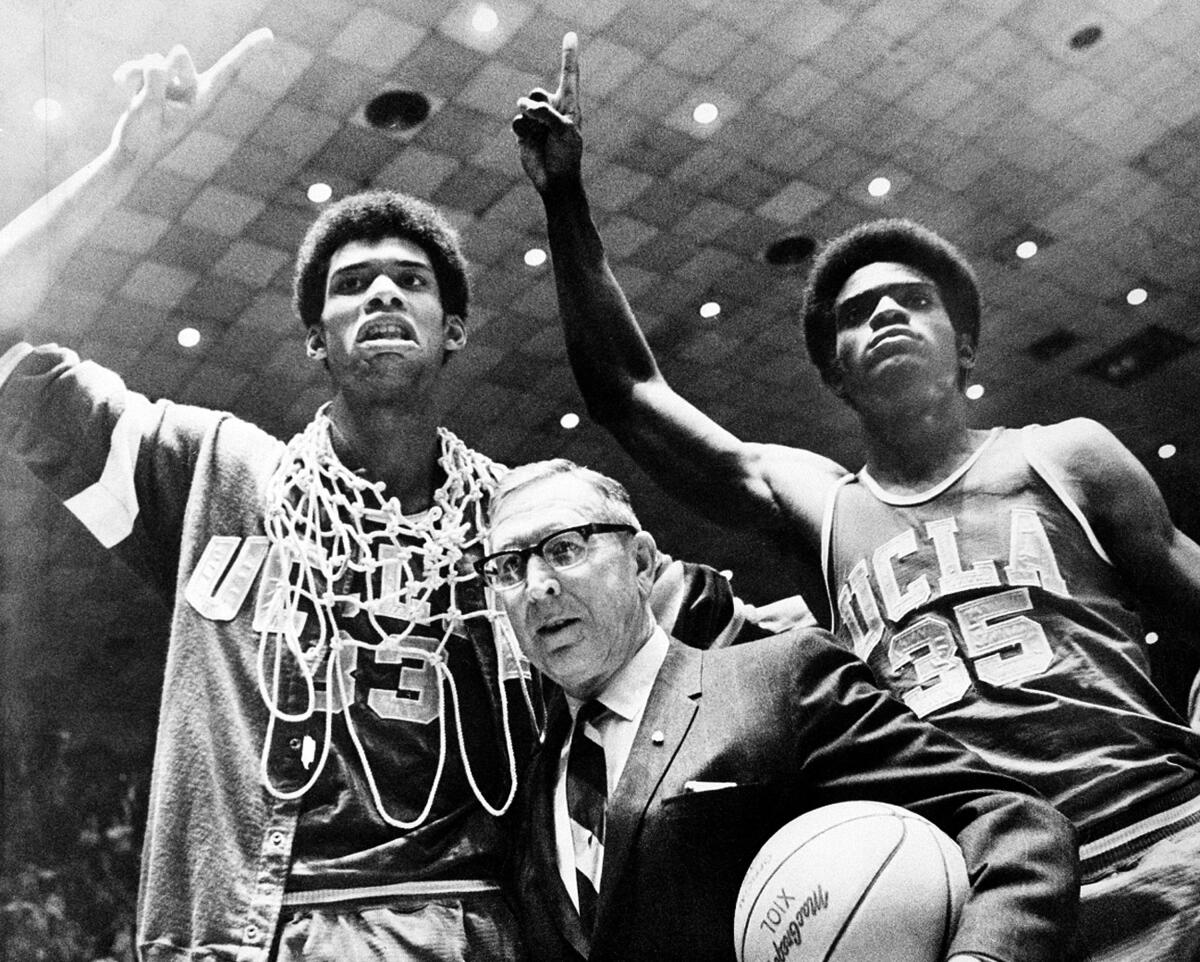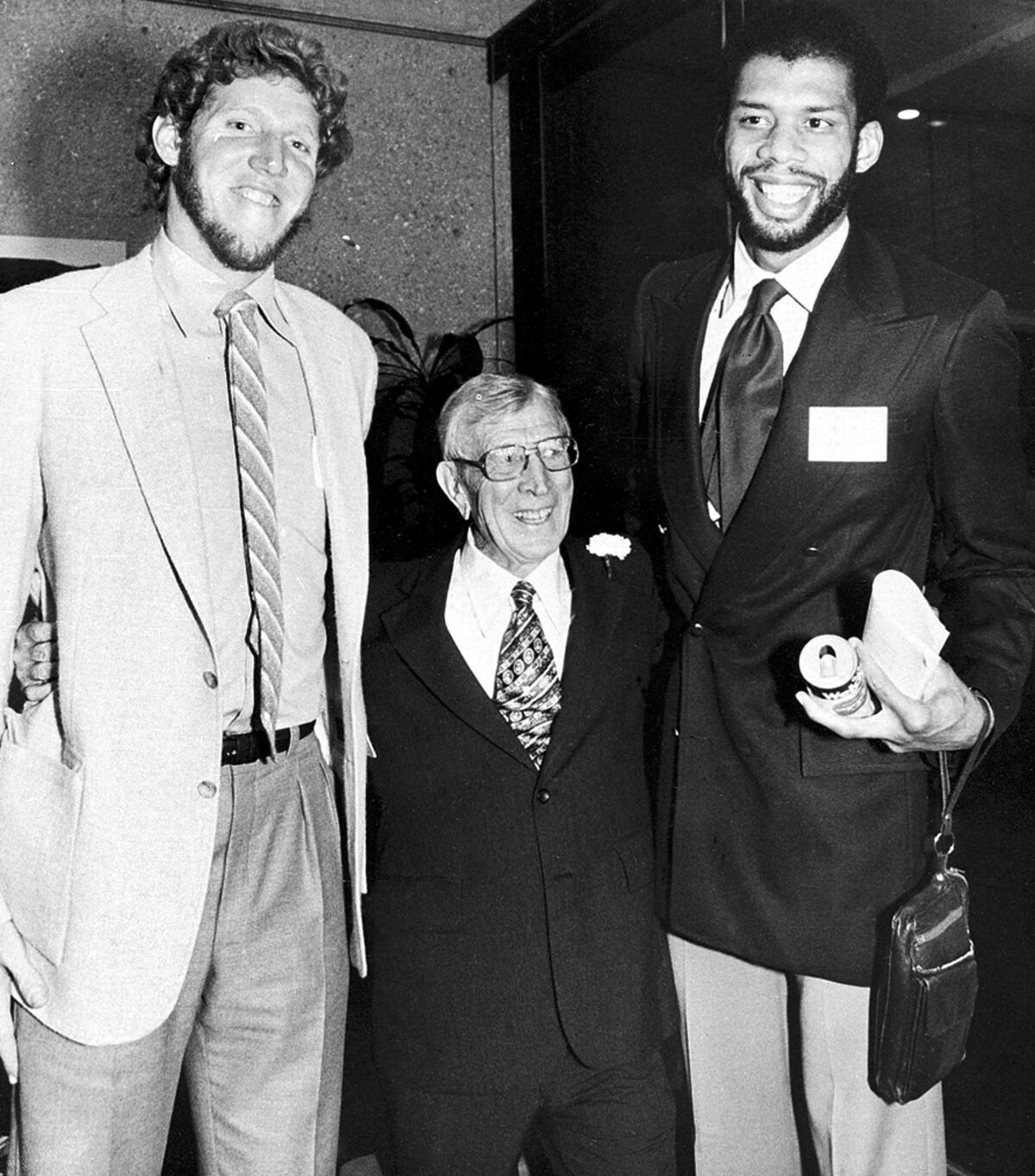Inside the Westwood diner where John Wooden, Jerry West and more forged hoops history

Jerry West had always been a taut rope emotionally, the aftershock of growing up with a physically abusive father in a West Virginia home so absent of warmth that one of his sisters named it “the ice house.” It got worse when an older brother he looked up to was killed in combat in the Korean War when Jerry was thirteen. The constant emotional anguish of early life turned him into a future superstar.
A kid who would stay outside shooting baskets even in the worst winter weather to avoid being home, until he turned himself into an all-time great with a smoldering, haunted soul. West became the brilliant Lakers guard with a career others would dream about and to himself the player who was never good enough, scorched by the times he did not win, especially the 6 losses to the Celtics in the Finals during the 1960s.
Even being named MVP of the ’69 series wasn’t good enough — L.A. lost to Boston despite his heroics. Decades later as arguably the greatest general manager in NBA history, coworkers in the front office still knew not to playfully jab the boss about Boston the same way they might fire devilish locker-room digs at others.

The usual stress overdose turned particularly dark as the late 1960s faded into the ’70s. The avalanche of boyhood trauma turned him inward and uncomfortable in public; he played for a team unable to climb higher than best in the Western Conference, in a town where a college team had a greater following and his marriage continued while irreversibly broken.
Late in the summer of 1969, West had the strange sensation of being followed in his white Ferrari, and not the same way kids would tail him as long as possible on drives home from the Forum after games. Reading Helter Skelter years later, the book detailing the murder spree by Charles Manson, Linda Kasabian, and other members of the Manson Family over three nights in August, West came to page 357: “Observing a white sports car ahead of them, Manson told Linda, ‘At the next red light, pull up beside. I’m going to kill the driver.’”
West often wondered if he could have been that driver. The Westwood Drug Store and especially Hollis Johnson’s, the cozy 1950s-style diner in back, became an island of calm in a Jerry West world spinning off its axis.
One of the biggest names in town may have appeared in Hollywood with expensive clothes and high-end Italian sports cars, but part of him longed for the West Virginia life of good, understated people and the outdoors, even if he wished the emotional demons that chased him from home would disappear.
He met fellow Mar Vista resident Hollis Johnson, discovered a mutual love of fishing, and became a regular at the luncheonette with a fading Formica counter, eight or ten upholstered swivel stools bolted into the ground. Best of all, it had a back room that made the public dining area seem glamorous, a little space where West turned empty delivery milk crates into a table and chairs.

Wooden and his assistants for years loved Hollis Johnson’s for the same reasons, with the bonus of it being a few blocks from the athletic department. Lunchtime walks down the gentle hill were common, until the staff was visiting so often that the namesake owner became a friend giving hoops advice to the men with multiple national championships. The actual experts nodded along in mock agreement, smiling through bad suggestions because Hollis was that great to be around, a latitude few others enjoyed in a time of Wooden frustrated by know-it-all fans. Many students knew Hollis’s kindness in slipping an extra burger or sandwich in the bag of food at the register, on the house and without mentioning it. Gary Cunningham became a fishing buddy, working Crowley Lake for trout at sixty-eight hundred feet in the Eastern Sierra, and West hit the same spot with Johnson other times.
West Virginia University and senior guard Jerry West beat John Wooden and the Bruins in the Los Angeles Classic on December 29, 1959, but they didn’t get to know each other until an introduction by Johnson after West joined the Lakers in 1960. Countless breakfasts and lunches followed in the back of the diner, beyond view of most customers, “two small-town, everyday guys shooting the breeze, not quite believing our good fortune, always knowing it could end tomorrow,” as West put it. “I have always loved hanging out in places where I can just be Jerry, and this place . . . became very important to me.”
Wooden, likely picking up on the tortured soul West never hid, became an immediate counselor. “Jerry,” Wooden said one day early in what became a friendship that lasted decades, “when your team won, did you take all the credit?” “No, Coach, of course not,” West replied in his twang. “Well, then, Jerry, when your team lost, there is no reason for you to take all the blame.” West understood, but did not change.
Assistant coach Jerry Norman occasionally took recruits to Hollis Johnson’s as part of campus visits in hopes of giving a true indication of daily life at UCLA, as opposed to a fancy restaurant the way many schools would in an attempt to impress. Sitting in the back also allowed more privacy and made for easier conversation than sitting shoulder to shoulder to shoulder in a row at the counter. Wooden, Norman, and the prospect instead circled a pair of orange crates pushed together for a table in the alley outside the back door and Johnson draped a tablecloth over the wood slats of the boxes. If West happened to be there, he would oblige Norman’s request to stop by, an all-time great player and an all-time great coach, just a couple everyday guys, pitching a high school kid in an alley.

Bill Walton came into West’s life in a similar way, through Hollis Johnson’s, but as the most unlikely dining companion compared to Wooden, Pat Riley, Gail Goodrich and others. West was 14 years older as Walton entered UCLA, one a proven superstar and the other a very promising but unproven freshman, one an adult who took pride in dressing well and the other a teenager so unkempt, to the point of slobbish, that West wanted to tell him to take a bath. The Walton parents were a constant support to Bill and his three siblings despite no interest in sports themselves, while West’s father and mother created a scary and cold home.
Walton already showed signs of turning activist while West was far from a social crusader, a role on the Lakers that belonged to forward Elgin Baylor, who had greater self-confidence and a life of growing up black in inner-city Washington. But Walton was a basketball sponge, and West, like Wooden, appreciated dedication above all, even talent. It just so happened Walton had a lot of both, and as far as he was concerned, West had been an important part of his life for about eight years, since Bill with a $9.95 transistor radio in San Diego dialed across Chick Hearn broadcasting Lakers games as the most exciting and interesting thing he’d ever heard.
Getting hooked on Hearn’s machine-gun delivery led to the Lakers becoming his favorite team. To then be able to walk from his dorm to the diner behind the Westwood Drug Store, enter the back door that saved the freshman with a stutter from unnecessary banter with customers, and often find Jerry West made Hollis Johnson’s a safe zone for Walton as well. While West enjoyed the diner as a place to escape his celebrity life, he did not notice the speech impediment as much as Walton craving anything hoops, morning after morning of conversation and Johnson delivering rounds of overstuffed omelets and stacks of pancakes to a turned-over milk crate in the room out of sight.
“I would be wolfing down this food,” Walton said. “Jerry would be there eating. He’d be on his way to practice. He would tell me about the NBA. It was just the greatest time.” West found him to be a character, fun and smart and bursting with energy, and West liked characters for being true to themselves. Plus, Walton “almost reminded me of someone from West Virginia ”— a compliment — “the way he dressed. Shaggy looking.” Strangely, the adult mentor living a Ferrari existence but longing for fishing-hole moments gained as much or more from the friendship. Walton, joined by Greg Lee, Keith Wilkes, and Tommy Curtis among the eight members of the freshman team, charged into the first day of practice with the same zeal that would come to mark each of his first three years.
A Bruin in his mind since sixth grade, he could barely contain himself as Wooden called the first-year players together on the court, walked them into the locker room, sat on a stool, and began to instruct the newest charges, certain, Walton said, “he was about to give us the key to heaven on earth, show us the path, guide us to become the next great team in history.” They got doused by the talk on shoes and socks instead, to be followed by pointers on how to tuck in their jerseys, tie the drawstring on their shorts, and dry themselves after showers, especially their hair.
The audience, full of eye rolls, struggled to keep from laughing out loud. Wooden removing his own shoes and socks for a demonstration, revealing varicose veins from lower leg to foot along with hammertoes, killed the remainder of the excitement. Leaving the close quarters, the Bruin understudies were directed to the stands to watch the varsity workout unfolding with precision from the first day, nonstop chatter from players on the court and a brisk tempo that reignited Walton. Pay attention, Wooden told the newcomers, because you are expected to now know the practice routine. “We thought at the time that a lot of the stuff Coach Wooden was selling ... were the stupidest things ever,” Walton later wrote. “But we never doubted the honesty, righteousness, dedication, preparation, commitment, and excellence that was behind it all.”
Excerpted from “Kingdom on Fire” by Scott Howard-Cooper. Copyright © 2024 by Scott Howard-Cooper. Reprinted by permission of Atria Books, an Imprint of Simon & Schuster, LLC.
More to Read
Go beyond the scoreboard
Get the latest on L.A.'s teams in the daily Sports Report newsletter.
You may occasionally receive promotional content from the Los Angeles Times.










